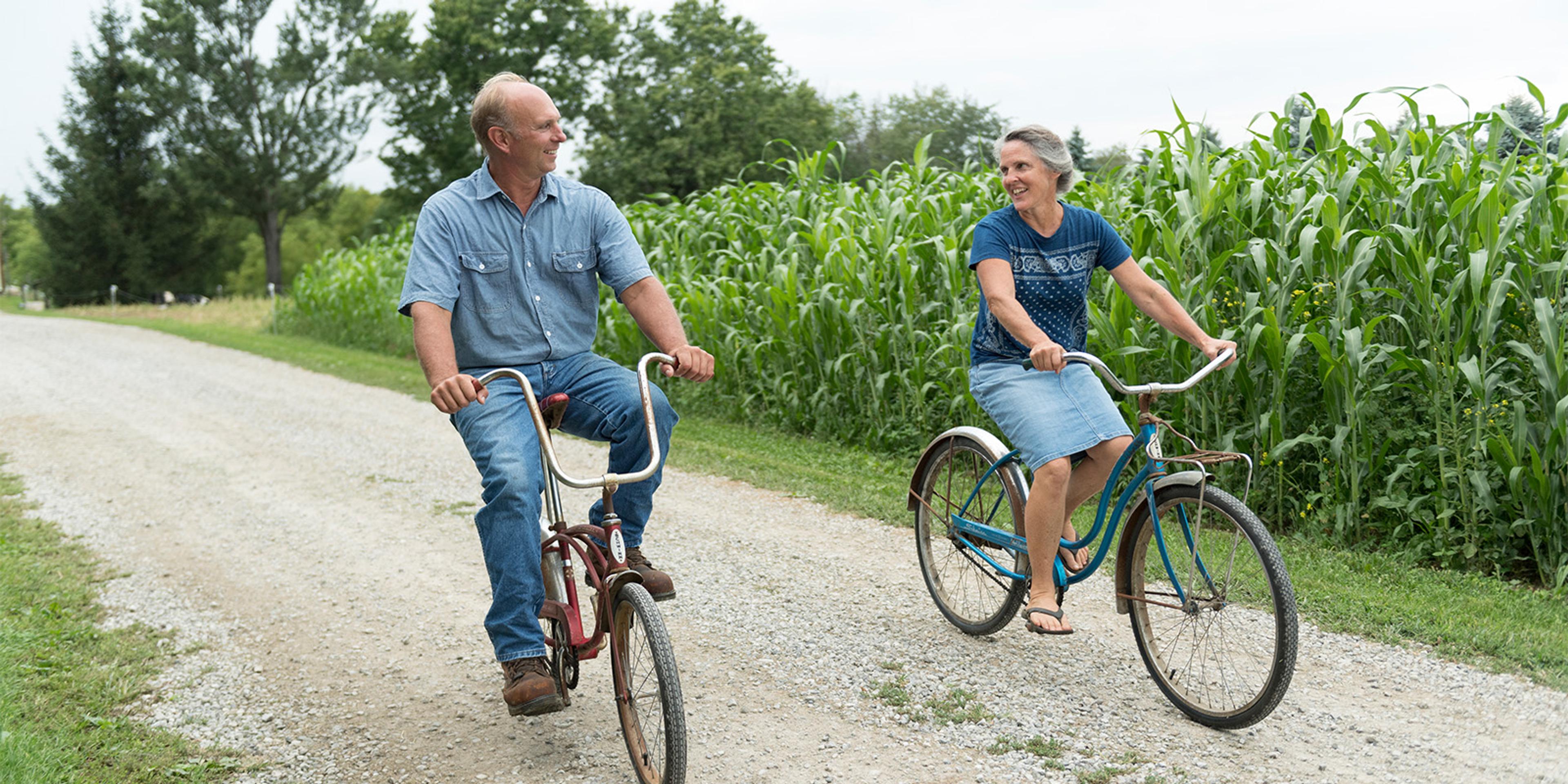
Farming
An Organic Change of Heart
The Gasser family knows what's up when it comes to organic farming. Their commitment to the well-being of animals and the earth is a perfect example of how organic farming practices can benefit consumers, animals and the environment. In the early days, the lush fields were not inspired with the sustainable ethos that now defines its management practices.
Greg and Julia Gasser are Organic Valley Grassmilk® farmers. They are the fifth generation living and working on the family farm in Ohio with Greg’s two brothers, sister and parents. They’re both from a farming background, but Julia had a lot to learn about the importance of organic when she married into the Gasser family.
They milk about 200 organic grass-fed cows, mostly Holstein and some Jersey cross cows, and Dutch Belted, Normande and Fleckvieh are also among the herd. Like all Organic Valley cows, the cows spend about 50% more time on grass than the certified organic requirement. They are free to spend their days doing cow things — like romping around, chewing their cud and just being beautiful bovines.

Cows follow Greg and Julia Gasser at their Ohio farm.
Reflecting on the Organic Journey
Jim Gasser, Greg’s dad, grew up on a conventional farm. He often spoke to his father about transitioning the farm to organic, but they didn’t think it could be done. However, a visit to an organic farm in the mid-80s made him think otherwise.
“I saw their crops, the healthiness of the crops, the healthiness and the beauty of the soil and just the whole thing — how it worked together and how the soil was a living thing and how they talked about a living soil,” Jim said. “I never wanted to look back after that.”
His dad gave him about 8 acres of land to “play with.” Convinced, they started the transition to organic in 1993. Growing up on an organic farm, Greg saw the value of organic farming from a young age and it was all he knew.
"It was the way my dad taught me. By being less reliant on chemicals and paying attention to plants, animals and the earth — it just kind of all made sense," Greg said. "My dad has often said a weed is just a plant out of place," emphasizing the importance of understanding and working with nature rather than against it.

Julia Gasser and Joanna Gasser, foreground, milk organic dairy cows.
Sharing Smiles and the Farm Story
Greg and Julia met on a fellowship weekend and got married in 2013. They welcomed their first child, Oakley, in 2021. After joining the family and getting hands-on organic farming experience, Julia realized the importance of an organic approach and now eagerly spreads the word about organic agriculture and farming in general.
Julia admits she thought organic farming was “weird” in the beginning. But once she was in it, organic farming made sense. Instead of trying to make farming fit into a specific mold, organic is about managing in harmony with how nature intended, she said.
The Gassers have become familiar faces on Organic Valley’s social media channels including YouTube, where Julia chronicles daily life on their farm. She educates about farming systems and brings smiles — I mean, who doesn’t smile when they see baby goats jumping around? (Confused? Check this out.)
Minimizing Impact on the Earth
The Gasser family’s farm exemplifies how sustainable farming practices can be successful and profitable. All of the Gasser cows are grass-fed, which means all the cows’ nutrition comes from fresh grasses. While they can go outside during the cold and snowy winter in Ohio, the cows rely on dried and stored forages and a few supplements like molasses and garlic salt. During the non-grazing season, grassmilk cows must consume all forage-based feeds like alfalfa, clover and grass.
By prioritizing their cows’ health and letting them be cows, they produce high-quality milk and other products while minimizing their impact on the earth. Greg and Julia attribute the milk’s nutritional profile, more omega-3s, less stress on the cows and longevity to many reasons they went grass-fed.
Their use of rotational grazing, which involves moving the cows to different parts of the farm to graze and rest, represents how sustainable farming can benefit both the animals and the environment. It allows the cows to graze on fresh grass while giving the land time to recover, which helps to reduce soil erosion and improve soil health. Soil health was a big reason why the Gassers got into grass-fed dairy.
“We want to leave the earth better than when we found it,“ Julia said.

Jim and Janice Gasser on a leisurely bike ride at their organic farm.
The Strength of Small Family Farms
In addition to their sustainable practices, the Gasser family believes in the importance of community. They’re all about supporting area businesses and producers, which helps the local economy and keeps family legacies alive.
They believe that smaller farms are part of the strength of the local economy. Through sharing their story and values with consumers, they hope to inspire others to prioritize sustainability and support their communities.
So, the next time you’re sipping coffee with Organic Valley Grassmilk Half & Half or enjoying a cheese and charcuterie board, think about the Gasser family and its commitment to sustainability, community and each other. They prove that sustainable farming practices can benefit everyone — the people, the animals and the earth.
Elizabeth McMullen works in public relations at Organic Valley. McMullen lives near the Mississippi River in the beautiful Driftless Region of Wisconsin. A self-proclaimed cow lover, she enjoys reading, being on the river and spending time with her family.
Related Articles
- Tags:
- farm life,
- organic & sustainable living,
- farmer voices


















